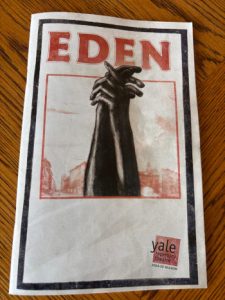
Eden At Yale Rep
The Yale Rep kicks off the new year with a welcome revival of Steve Carter’s 1976 play, Eden. The first of Carter’s so-called Caribbean Trilogy, Eden won awards both in New York and Los Angeles, but as far as I can tell has been revived only sporadically. That’s too bad.
Eden may have its flaws, but it’s virtues far outweigh them. Brandon J. Dirden’s taut production makes a persuasive case for Eden’s inclusion in the theatrical canon.
Eden takes place in New York City’s San Juan Hill neighborhood, which was razed to make way for Lincoln Center. Joseph Barton (Russell G. Jones), an ardent follower of Marcus Garvey and his Back To Africa movement, immigrated from the Caribbean to New York to proselytize for the cause, which seems to be losing ground. Intriguingly, Carter has set the play in 1927, the year Garvey was deported to his native Jamaica after a conviction for mail fraud.
Barton chose to come to the United States because it had the largest concentration of descendants of the African slave trade. Ironically, his intense desire to save these benighted people and lead them back to Africa is more than matched by his disdain for their culture, their bad language, and what he sees as their dissolution and idleness.
Barton, as written by Carter and played (brilliantly) by Jones, is a monster, an almost cartoonish representation of everything that is wrong with patriarchy. He rules his household with an iron fist, demanding total obedience and absolute fealty to Garvey’s cockamamie philosophy.
Alas for Barton and his imagined Eden, his four children were born in the United States and like all children of immigrants are becoming, slowly, inexorably “American,” which in this case means ever more like the African-Americans Barton looks down on.
Barton decides that his youngest daughter, Annetta (Lauren F. Walker), for whom he sees nothing more than a life of domestic servitude, will marry a fellow Caribbean immigrant to keep the blood “pure.” She rebels and is brutally whipped.
The plot of Eden hinges on the love affair between Annetta and Eustace Baylor (Chancre Hall-Broomfield), a southern country boy who has come to the big city to live with his aunt Lizzie (Heather Alicia Simms).
When they meet, sparks fly and the travails of these star-crossed lovers becomes the two-hours’ passage of Carter’s Eden. Just as in Romeo and Juliet, it ends badly, minus the potions and suicides.
The dramaturg who contributed a program note is obviously uncomfortable with the depiction of the friction between proud, industrious West Indians and their African-American cousins, mostly transplants from the deep South.
We are told that Eden simply illustrates the way in which both sides are equally victims of “white supremacist and colonial power,” and that “the harm done by them on Black bodies is implicit in the conflict between these two families.”
The case can be made, certainly. But this reductivist reading strips Eden’s characters of all agency and renders them hapless victims. Carter’s play on the other hand bursts with life as lived by fully rounded characters exhibiting all the contradictions that humanity is heir to. It might be noted that Garvey made common cause with the K.K.K. because, like them, he believed in the total separation of the races.
This cultural divide, by the way, is a long-standing trope that was turned to tremendous comic effect decades later by the Black sketch comedy television show In Living Color, demonstrating a far more nuanced take on the subject. (Search for “hey mon” on YouTube.)
But enough cultural politics. The real reason to go see Carter’s Eden is the richness of its detail, the vibrancy of its characters, and its celebration of the Black experience in America.
Under Dirden’s direction, this is a first-rate production, starting with George Zhou’s ingenious set that combines the Barton’s neat-as-a-pin flat with the hallway outside and even the laundry-draped rooftop where Eustace and Annetta consummate their love.
Ein Kim has contributed some lovely white-on-black projections that are deployed to often eerie effect. Ankit Pandey has lit it all sensitively and Tojo Rasedoara has contributed pitch perfect original music and sound design.
Best of all are the performances. Jones’ Barton is perfectly loathsome, as he should be. Hall-Broomfield’s Eustace is all boyish charm, until roused to anger. Walker brings just the right tone of sweetness to Annetta and Simms makes Lizzie an absolute hoot in a small role. Emerging late in the action as a central character is Barton’s long-suffering wife, Florie. Hers was an arranged and loveless marriage and as portrayed by Christina Acosta Robinson, she is a powerfully tragic figure.
Perhaps because Carter wanted to offer Joseph Barton at least some partial redemption, there are some last-minute grace notes in the text that I found hard to reconcile with what had passed before. But my reservations don’t detract from the power of this play.
If only for the vividness of its characters, Eden deserves to enter into regular rotation with other American classics.
Eden continues at the Yale Rep through February 8, 2025. For more information and to purchase tickets visit the Yale Rep website.
Footnote: In one of his last acts before leaving office, President Joe Biden granted Marcus Garvey a full pardon.
Footnote: I almost left the theatre before the play began when the “Content and Atmospheric Guidance” note in the program warned me that “This production also includes use of herbal pipe smoke which is tobacco- and nicotine-free.” Is there no end to the depravity of contemporary theatre?
For a complete index of reviews CLICK HERE.
Don’t miss another review or blog post! SUBSCRIBE HERE
GET THE SCRIPT


